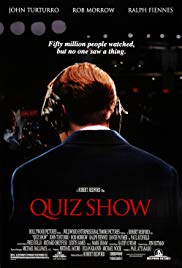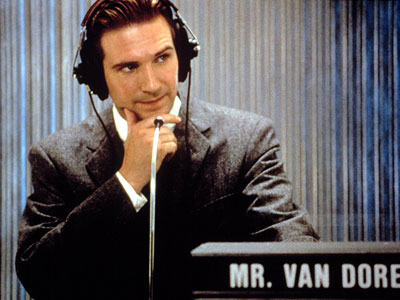QUIZ SHOW
SUBJECTS — U.S./1945 – 1991 & New York;
SOCIAL-EMOTIONAL LEARNING — Ambition; Father/Son;
MORAL-ETHICAL EMPHASIS — Trustworthiness.
AGE: 11+; MPAA Rating — PG-13;
Drama; 1994; 137 minutes; Color.
There is NO AI content on this website. All content on TeachWithMovies.org has been written by human beings.

SUBJECTS — U.S./1945 – 1991 & New York;
SOCIAL-EMOTIONAL LEARNING — Ambition; Father/Son;
MORAL-ETHICAL EMPHASIS — Trustworthiness.
AGE: 11+; MPAA Rating — PG-13;
Drama; 1994; 137 minutes; Color.
TWM offers the following worksheets to keep students’ minds on the movie and direct them to the lessons that can be learned from the film.
Film Study Worksheet for a Work of Historical Fiction and
Worksheet for Cinematic and Theatrical Elements and Their Effects.
Teachers can modify the movie worksheets to fit the needs of each class. See also TWM’s Historical Fiction in Film Cross-Curricular Homework Project.
In the late 1950s, television quiz shows were all the rage. The knowledge of some of the contestants was phenomenal. Few people knew that the shows were rigged. This film is a fairly accurate portrayal of how the scandal over the rigging of quiz shows developed, how it was uncovered, and the aftermath.
Selected Awards: 1994 British Academy Awards: Best Adapted Screenplay; 1994 New York Film Critics Awards: Best Film; 1994 Academy Award Nominations: Best Picture, Best Director (Redford), Best Supporting Actor (Scofield), Best Adapted Screenplay; 1995 Golden Globe Awards Nominations: Best Film-Drama, Best Director (Redford), Best Supporting Actor (Turturro), Best Screenplay.
Featured Actors: John Turturro, Rob Morrow, Ralph Fiennes, Paul Scofield, David Paymer, Hank Azaria, Christopher McDonald, Johann Carlo, Elizabeth Wilson, Mira Sovino, Griffin Dunne, Martin Scorsese, Barry Levinson.
Director: Robert Redford.
“Quiz Show” will introduce the scandals, the congressional investigative process, and show how a large corporation, in this case, the National Broadcasting Company, deceived the public and then escaped punishment. The film shows children in graphic terms that they can’t believe much of what is shown on television. Be sure to read the film’s postscript concerning what happened to the major players.
MINOR. There is a lot of smoking, mostly cigar smoking, and some profanity in this movie.
Ask and help your child to answer the Quick Discussion Question.

Television broadcasting began in London in 1936. In the U.S. it began in 1941. Nationwide broadcasts gained popularity in the early 1950s. Until the advent of cable, television broadcasting was dominated by the three networks, NBC (National Broadcasting Company), CBS (Columbia Broadcasting Company) and ABC (American Broadcasting Company).
Each branch of the United States Congress (the Senate and the House of Representatives) has divided its work among various committees. The committees hold hearings on important topics and report their findings to the full Senate or House of Representatives. Some committee hearings become public spectacles.
In 1957 the USSR launched Sputnik 1, becoming the first nation to send a satellite into orbit around the earth. The United States had been working towards space exploration before this time but was shocked by the sudden ascendancy of Russian technology in this area. See Learning Guides to The Right Stuff and October Sky.
1. See Discussion Questions for Use With any Film that is a Work of Fiction.
2. Would the quiz shows have been as popular as they were if the public had known that some of the contestants were being fed the answers?
3. Was Van Doren trying to compete with his father by being a quiz show hero? What did you think about Van Doren’s relationship with his father?
4. What did Goodwin’s wife mean when she told him “You’re the Uncle Tom of the Jews.” Did Goodwin go too easy on Van Doren? Why do you think he reacted to Van Doren in the way that he did?
5. Is it fair that Van Doren was ruined but that the designers of the quiz show and the network got off very lightly? Can you think of reasons why it turned out this way?
6. Why was it difficult for the Senators to criticize the network?
1. What was Van Doren’s motivation in cheating on the quiz shows?
2. What did the success of Van Doren’s father have on the actions of his son?
Discussion Questions Relating to Ethical Issues will facilitate the use of this film to teach ethical principles and critical viewing. Additional questions are set out below.
(Be honest; Don’t deceive, cheat or steal; Be reliable — do what you say you’ll do; Have the courage to do the right thing; Build a good reputation; Be loyal — stand by your family, friends, and country)
1. What harm was there in dishonest quiz shows? Why was the public so outraged when they found that the network had been feeding the answers to some of the contestants?
This Learning Guide was last updated on December 17, 2009.